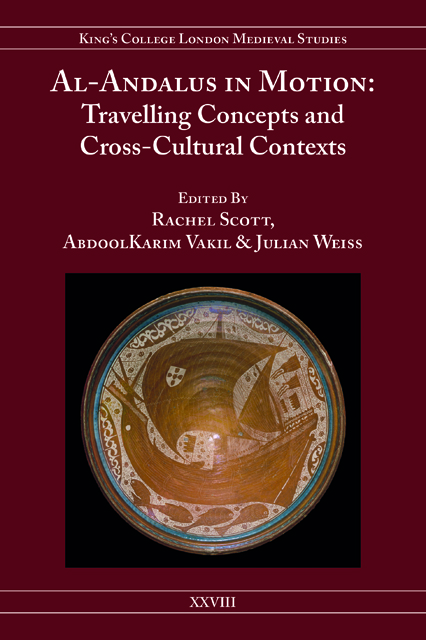Book contents
- Frontmatter
- Contents
- List of Illustrations
- Acknowledgements
- Notes on Contributors
- Part I Departure Points
- Part II Translating Al-Andalus: Travelling across Languages
- Part III (Re)Visions of Al-Andalus in Diaspora and Exile
- Part IV Andalusi Space as Node and Utopia: Europe, Islam, Empire
- Part V Al-Andalus and the Politics of Religious Identity
- Part VI Legacies, Landscapes and ‘Travel Buildings’
- Epilogue
- Index
12 - Travelling with and through Al-Andalus
Published online by Cambridge University Press: 02 June 2023
- Frontmatter
- Contents
- List of Illustrations
- Acknowledgements
- Notes on Contributors
- Part I Departure Points
- Part II Translating Al-Andalus: Travelling across Languages
- Part III (Re)Visions of Al-Andalus in Diaspora and Exile
- Part IV Andalusi Space as Node and Utopia: Europe, Islam, Empire
- Part V Al-Andalus and the Politics of Religious Identity
- Part VI Legacies, Landscapes and ‘Travel Buildings’
- Epilogue
- Index
Summary
The pioneering Orientalist Reinhart Dozy (1820–83) closed his now classic four-volume history of Muslim Spain with a literary anecdote about the legendary eleventh-century poet-king, al-Mu’tamid Ibn Abbad, the last ruler of the Taifa kingdom of Seville, deposed by the Almoravids and exiled to Aghmat in southern Morocco, where he died in 1095. Dozy relates how a Sevillian travelling in the desert rewards a Bedouin sheikh for his hospitality by reciting to him one of al-Mu’tamid's poems.1 Moved by its beauty the Sheikh asks after its author and, on learning his name, discovers that he belongs to his own tribe and promptly rouses his companions to reclaim the poet as their own. The life and poetry of al-Mu’tamid would continue to resonate to diverse sensibilities, and for four interlocking reasons: the drama of his life, love and a friendship betrayed; the number and beauty of his extant poems and the fact that they give him a voice; his imprisonment, exile and death at the hands of the Almoravid ruler whom he himself had summoned across the Straits to combat the Christians; and the fact that his tomb at Aghmat has become a cultural pilgrimage site. A human tragedy; exile and imprisonment; aesthetic prowess; the voice of the vanquished; the desire to recognise and understand the significance of the past; fulfilling that desire through travel, whether through exile or pilgrimage: al-Mu’tamid, his verse and his displacement, are embodiments of al-Andalus. As I suggested in my introductory essay, human metonymies rather than detailed political histories set al-Andalus in motion. And the part one chooses to represent the whole will determine if not the entire journey, at least a point of departure. The personal journey that follows, one of many possible routes, is guided by my own interests in Portuguese intellectual and cultural history, decolonial and critical Muslim studies.
Identifying with exiles
The anecdote recorded by Dozy would also be recounted, a century apart, by two of the most important Islamophile writers in Portuguese literature, Antonio Maria de Oliveira Parreira (1836–1918) and Adalberto Alves (b. 1939).
- Type
- Chapter
- Information
- Al-Andalus in MotionTravelling Concepts and Cross-Cultural Contexts, pp. 313 - 340Publisher: Boydell & BrewerPrint publication year: 2021

